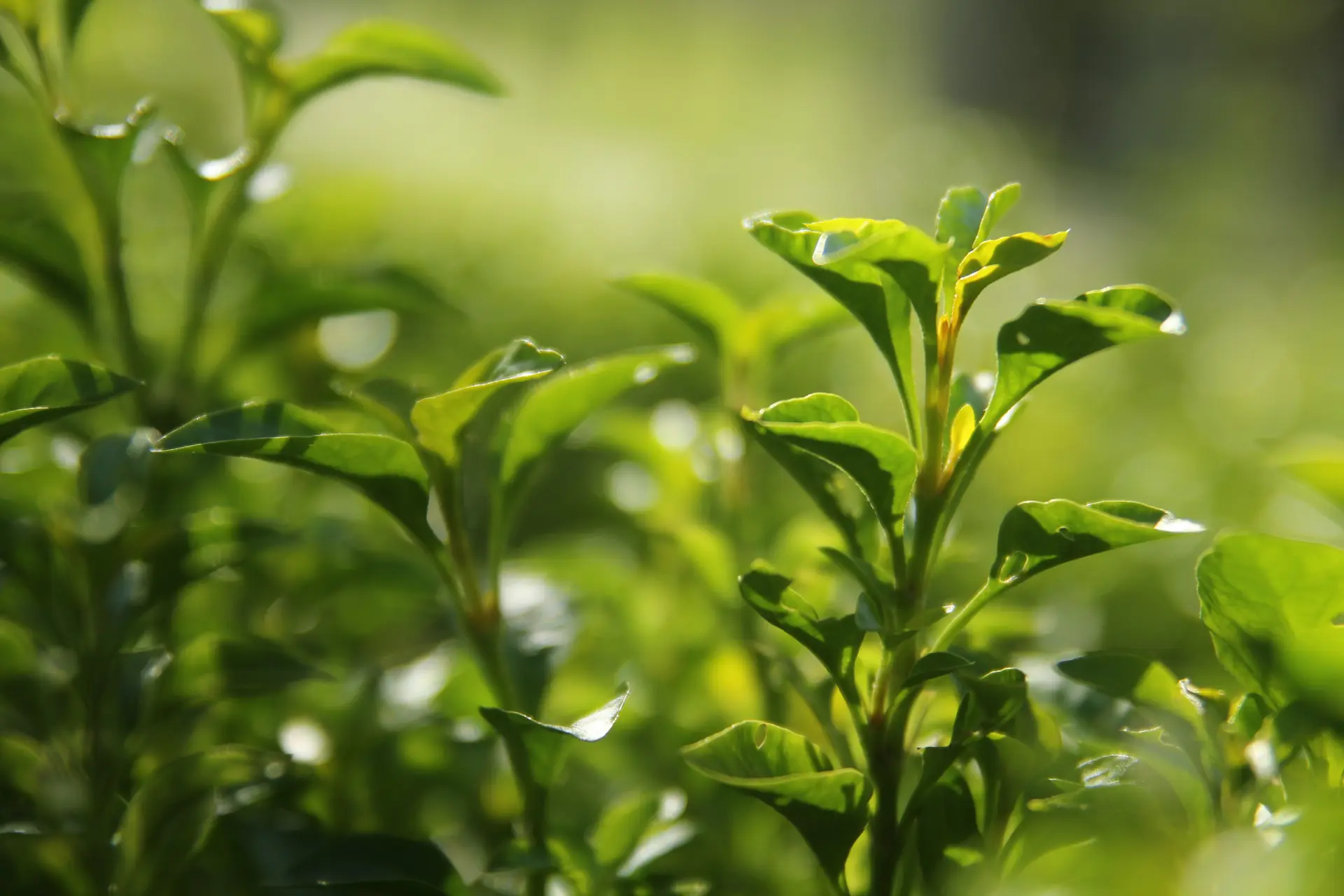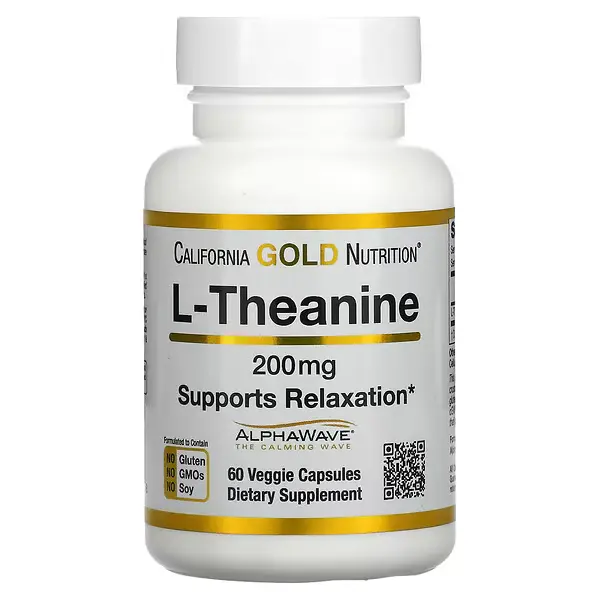L-theanine
What is L-Theanine?
Theanine is an organic compound primarily found in plant and fungal species that has a similar structure to the amino acids glutamate and glutamine. Its chemical name is L-γ-glutamylethylamide in which the L refers to the specific orientation of the molecule. When speaking about theanine it is generally referring to L-theanine, the form in which it is naturally most found. [1] It has an umami taste just as glutamate.
Where does L-Theanine come from?
It was first discovered in 1949 as a part of green tea. A year later, it was successfully isolated from a tea leaf. It can be found in all kinds of tea but predominantly in black, green and white tea where it constitutes between 1 and 2% of the dry weight.[2] Supplements on the market may contain either theanine extracted from natural products like tea or synthetically made theanine. The latter of which might contain not only L-theanine but also D-theanine, its mirrored counterpart.[3]
What are the effects of L-Theanine?
Theanine has a similar structure to the neurotransmitter glutamate and as such can bind to the same receptors albeit with a lower affinity. Glutamate is involved in a lot of different systems with a lot of different functions including a group of receptors involved in learning, memory, anxiety and pain perception.[4][5] Theanine has shown to increase, amongst others, serotonin, dopamine and glycine levels in parts of the brain.[6] [7] Due to the wide range of potential interaction with the central nerve system, theanine has been the subject of lots of different studies on different potential effects. One of those being used to combat Parkinson and Alzheimer disease.[9][10]
Cognitive
- Increased relaxation
- Reduced anxiety
- Increased attention
- Reduced blood pressure
- Reduced stress
Physical
- Increased relaxation
- Reduced cholesterol[8]
How to use L-Theanine?
Theanine can be supplemented in many different ways. The pure supplements are available as powders, capsules and pills. It could also be supplemented as part of matcha powder which is a green tea powder which contains relatively high concentrations of theanine. As a supplement, powders are great to fine-tune the preferred dosage compared to capsules or pills which can be considered easier to use. Adding matcha or other green tea as a healthy habit may be the best way to use theanine if not looking for immediate high-dose effects.
How much L-Theanine to use?
When trying out new supplements it is wise to start with a lower dose and–depending on the experienced effects–increase or decrease the dosage accordingly
Theanine is considered as generally safe to use in doses of up to 1200 mg daily. Studies evaluating different potential effects have used varying doses ranging from 50 mg once a day to 210 twice a day. A low dose multiple times a day may be beneficial if looking for general health benefits. A single higher dose 100-250 mg may be the right choice when looking for immediate benefits like improved sleep or increased attention.
What are the side effects of L-Theanine?
Theanine can cause a headache in some people when taken in high doses. This effect may be comparable to the discomfort some people experience when consuming foods high in monosodium glutamate (MSG). Other side effects might include dizziness or stomach ache.
Interactions of L-Theanine
Most nootropics are relatively safe to use on their own. Combining them with other substances may cause them to suddenly become dangerous or life-threatening.
Theanine has the ability to reduce the blood pressure so people taking blood pressure medication should contact their physician about supplementing L-theanine.
Theanine is known for its synergistic combination with caffeine. This combination is naturally found in teas but maybe not in the desired doses or ratio. Black teas are usually higher in caffeine whereas matcha green teas are relatively higher in theanine. Theanine has shown the potential to diminish the negative aspects of caffeine while simultaneously sharing some of the positive aspects like increased attention.[11] [12]
Related articles
References
- [1] Juneja, L. (1999). L-theanine—a unique amino acid of green tea and its relaxation effect in humans. Trends in Food Science & Technology, 10(6–7), 199–204. https://doi.org/10.1016/s0924-2244(99)00044-8
- [2] Bryan, J. (2008). Psychological effects of dietary components of tea: caffeine and L-theanine. Nutrition Reviews, 66(2), 82–90. https://doi.org/10.1111/j.1753-4887.2007.00011.x
- [3] Desai, M. J., & Armstrong, D. W. (2004). Analysis of derivatized and underivatized theanine enantiomers by high-performance liquid chromatography/atmospheric pressure ionization-mass spectrometry. Rapid Communications in Mass Spectrometry, 18(3), 251–256. https://doi.org/10.1002/rcm.1319
- [4] Nathan, P., Lu, K., Gray, M., & Oliver, C. (2006). The Neuropharmacology of L-Theanine(N-Ethyl-L-Glutamine). Journal Of Herbal Pharmacotherapy, 6(2), 21–30. https://doi.org/10.1300/j157v06n02_02
- [5] Nagasawa, K., Aoki, H., Yasuda, E., Nagai, K., Shimohama, S., & Fujimoto, S. (2004). Possible involvement of group I mGluRs in neuroprotective effect of theanine. Biochemical and Biophysical Research Communications, 320(1), 116–122. https://doi.org/10.1016/j.bbrc.2004.05.143
- [6] Wakabayashi, C., Numakawa, T., Ninomiya, M., Chiba, S., & Kunugi, H. (2011). Behavioral and molecular evidence for psychotropic effects in l-theanine. Neuroscience Research, 71, e198. https://doi.org/10.1016/j.neures.2011.07.858
- [7] Yokogoshi, H., & Terashima, T. (2000). Effect of theanine, r-glutamylethylamide, on brain monoamines, striatal dopamine release and some kinds of behavior in rats. Nutrition, 16(9), 776–777. https://doi.org/10.1016/s0899-9007(00)00384-1
- [8] Bolling, B. W., Chen, C. Y. O., & Blumberg, J. B. (2009). Tea and health: preventive and therapeutic usefulness in the elderly? Current Opinion in Clinical Nutrition & Metabolic Care, 12(1), 42–48. https://doi.org/10.1097/mco.0b013e32831b9c48
- [9] Cho, H. S., Kim, S., Lee, S. Y., Park, J. A., Kim, S. J., & Chun, H. S. (2008). Protective effect of the green tea component, l-theanine on environmental toxins-induced neuronal cell death. NeuroToxicology, 29(4), 656–662. https://doi.org/10.1016/j.neuro.2008.03.004
- [10] Takeda, A., Sakamoto, K., Tamano, H., Fukura, K., Inui, N., Suh, S. W., Won, S. J., & Yokogoshi, H. (2011). Facilitated Neurogenesis in the Developing Hippocampus After Intake of Theanine, an Amino Acid in Tea Leaves, and Object Recognition Memory. Cellular and Molecular Neurobiology, 31(7), 1079–1088. https://doi.org/10.1007/s10571-011-9707-0
- [11] Haskell, C. F., Kennedy, D. O., Milne, A. L., Wesnes, K. A., & Scholey, A. B. (2008). The effects of l-theanine, caffeine and their combination on cognition and mood. Biological Psychology, 77(2), 113–122.
- [12] Parnell, H., Owen, G., & Rycroft, J. (2006). Combined effects of L-theanine and caffeine on cognition and mood. Appetite, 47(2), 273.
| Name | L-theanine |
| Effects | Sleep, Focus, Anxiety Reducing |
| Dosage | 50 ~ 250 mg Low to medium dosage 50 250 500 |

